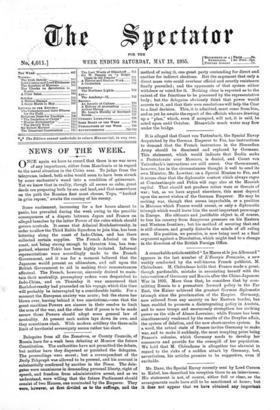Delegates from all the Zemstvos, or County Councils, of Russia
have for a week been debating at Moscow the future Constitution. The authorities have not permitted the debate, but neither have they dispersed or punished the delegates. The proceedings were secret; but a correspondent of the Daily Telegraph was allowed to be present, and his account is substantially confirmed by another in the Times. The dele- gates were unanimous in demanding personal liberty, right of speech, and freedom from administrative arrest, and as we understand, were willing that the future Parliament should consist of two Houses, one nominated by the Emperor. They were, however, at first divided as to the suffrage, and the.
method of using it, one great party contending for direct and another for indirect elections. But the argument that only a direct mass vote could overbear official and courtly resistance finally prevailed ; and the opponents of that system either withdrew or voted for it. Nothing clear is reported as to the extent of the functions to be possessed by the representative body; but the delegates obviously think that power would accrete to it, and that their own resolutions will help the Czar to a final decision. This, it is admitted, must come from him, and as yet he awaits the report of the officials who are drawing up a "plan," which, even if accepted, will not, it is said, be acted upon until October. Meanwhile much water may flow under the bridge.






































